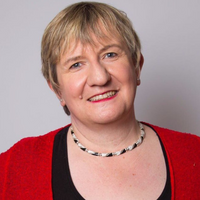
 July 2023
July 2023
What is your current role?
I’m an advanced nurse practitioner in the kidney transplant team at Evelina London. An advanced nurse practitioner is a nurse who has undertaken further studies and obtained academic qualifications to be able to assess, examine, diagnose, prescribe medicines and treatments for their patients. Together with my team, we provide long-term care for children who have had kidney transplants at Evelina London.
What is your favourite part of working for Evelina London?
What a hard question as I’m not sure I can choose one favourite part! Evelina London is like my second home. I came here as a student many, many, many years ago and became hooked and have been working here since 1994. So many people think having a kidney transplant is a cure, however children can experience significant complications after transplantation, as a consequence of immunosuppression and certain medicines. These complications include infections, diabetes and cancer. For some it can feel like being struck by lightning twice, as the child experiences a second or third serious health challenge. Whatever the challenge faced by the child and family, my team and I will provide the best care and support possible, in some ways sharing their journey. It's why the Transplant Games are so important to us, bringing children and families together, away from the hospital environment enables them to build friendships and support networks that can last a lifetime.
How do our kidney services support patients being treated for additional conditions, such as cancer?
Many of our transplant patients have complex health needs and may be under the care of several different specialist teams, in some cases in different hospitals. Putting the child and family at the centre of all we do is important to my team, who include doctors, nurses, health play specialists, dieticians, pharmacists, social workers or family support workers, psychologists and school teachers. We all aim to work closely with all the professionals involved in a child's care, whether they are in the community, primary, secondary or other tertiary teams.
What is your passion?
In my transplantation work, I am passionate about providing the highest quality care possible, by working with our national and international colleagues. In my kidney care work, I am particularly passionate about young adult healthcare, helping to empower my young adult patients not to be defined by their health condition. I am also passionate about trying to make the lives of my patients and their families better and am honoured to be a trustee of the patient charity Kidney Care UK.
In addition to this, I am very passionate about teaching. I enjoy teaching the children I care for together with their families. I really enjoy teaching colleagues, both at Evelina London and around the world. I was honoured to be made an honorary senior lecturer at the University of Cape Town, where I regularly teach. At the end of this month, I will be presenting my team’s work at the International Paediatric Transplant Congress, which is exciting.
What is your proudest moment?
This is a difficult question to answer as there are so many moments to be proud of in my Evelina London life!
I was very proud to receive the International Transplant Nursing Excellence award some years ago, the Trust’s annual Care Award and the Trust's Nightingale Award, which are all very special.
I help to organise the Evelina London VIPs annual expedition to compete at the British Transplant Games. Watching the children I care for at the hospital pushing themselves and excitedly taking part in sports has been amazing, and I’ve been so proud when they have won the National Best Kidney Kids Award many times! You can check us out on Twitter @evelina_vips.
Another proud moment has to be going over the edge and taking part in the Guy’s and St Thomas’ Abseil with my transplant consultant colleagues Helen and Nick. Despite being very nervous, we decided we’d go over the edge together and we raised lots of money doing so which was great.
However, if I had to choose one moment then it would be when my former patients keep in touch to tell me their news and achievements in life, and I realise I had a part to play in their early years – that makes me so proud.
What does being part of Evelina London mean?
People often talk about the Evelina London family but it’s not a myth. I work with incredible colleagues who all go the extra mile to try and make life the best it can be for the children in our care. Even during incredibly busy or stressful times (and there are many of them!), there is always someone nearby for support, which is an incredibly comfortable feeling.
Tell us one fun fact about your job...
Our kidney clinic is in Penguin and our Transplant Games team are called the Evelina London VIPs, standing for very important people, patients and most importantly penguins! Although my love of penguins was initially associated with where our transplant clinic was located, I now have multiple penguin accessories at home! And whenever I teach in Cape Town I always make time to visit the amazing penguin colony nearby in Boulders Beach!

Thank you to the children and young people who have so brilliantly illustrated our blog pages.